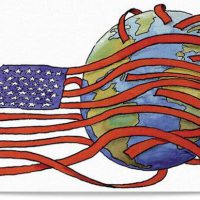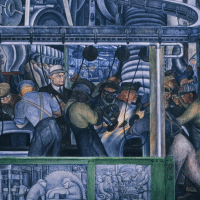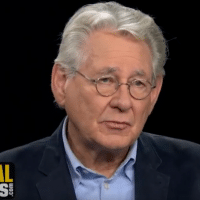-
Can the Monroe Doctrine triumph in the 21st century?
Although many of us would like to answer this question with a resounding “No!” and insist that our region is well prepared to defend itself against the 1823 pretensions of President James Monroe, with his “America for Americans” -which must be understood as “America for the United States”- it would be a serious mistake to underestimate the risks.
-
Gender and capital 150 years later
We are witnessing an era of conservative backlash on gender rights. Nearly across the board, women make less than men, make up a majority of those in poverty (70% of those in extreme poverty), and face the real prospect of becoming a victim of sexual violence (1-3 internationally).
-
U.S. trade deficits, Trump trade policies, and capitalist globalization
Understandably concerned about the consequences of the large and sustained U.S. trade deficit, many workers have grown tired of waiting for so-called market forces to produce balance. Thus, they cheer Trump administration promises to correct the imbalance through tariffs or reworked trade agreements that will supposedly end unfair foreign trade practices.
-
Google and corporate news giants forge alliance to defeat independent journalism
The “new media” monopolists of Silicon Valley and the once-dominant traditional print media have clearly agreed that the “fake news” frenzy is a convenient pretext to step up their censorship of the internet through new algorithms, allowing them to boost their profit margins and silence opposition through a new framework of “algorithmic censorship.”
-
The new CIA director nominee and the massacre at My Lai
Protecting those who commit heinous crimes in the name of the U.S. government provides a dangerous precedent and could lead to the conclusion by many in the military and CIA that they can “get away with murder,” Ann Wright observes.
-
Today’s capitalism was born in slavery
By 1830, one million Americans, most of them enslaved, grew cotton. Raw cotton was the most important export of the United States, at the center of America’s financial flows and emerging modern business practices, and at the core of its first modern manufacturing industry.
-
Buyback this!
I have been arguing, since 2016, that one of the likely outcomes of the kind of corporate tax cuts Donald Trump and his fellow Republicans have supported—and, as we saw, eventually rammed through—would be an increase in inequality.
-
Imperialist realities vs. the myths of David Harvey
When David Harvey says “the historical draining of wealth from East to West for more than two centuries has largely been reversed over the last thirty years,” his readers will reasonably assume that he refers to a defining feature of imperialism, namely the plunder of living labour and natural wealth in colonies and semi-colonies by rising capitalist powers in Europe and North America. Indeed, he leaves no doubt about this, since he prefaced these words with reference to “the old categories of imperialism.” But here we encounter the first of his many obfuscations.
-
Willetts the conqueror (part 4): audit culture
This reserve army provides an increasing number of desperate and mostly unionised workers to occupy the new, outsourced, deprofessionalised jobs while remind those lucky enough to retain work that they can be replaced if they dare to cause trouble.
-
Is another world possible?
On Reality Asserts Itself, Prof. Leo Panitch says it’s a dilemma that the gradualism of European social-democracy and attempts at a more radical transformation have so far both failed; Panitch says a first step towards democratizing the economy is to make finance a public utility – with host Paul Jay
-
Enclosed thinking
In a slave society, one can argue, the interest of the slaves lies in keeping the slave owner happy, for otherwise he is likely to flog and whip them mercilessly which would cause them great agony. Likewise in a caste society, one can argue, the interest of the Dalit lies in being as inconspicuous as possible, in not ‘polluting’ the upper castes through his presence, for otherwise he is likely to be beaten and lynched.
-
Does capitalism depend on credit?
Credit is essential for the continuation of capitalism but also a major source of its instability, writes the Marx Memorial Library.
-
Nervous about Russia
Two weeks ago in Salisbury, less than 10 kilometres from the UK’s Porton Down chemical weapons establishment, a Russian and his daughter appear to have been poisoned. Sergei Skripal was a former Russian military intelligence officer who acted as a spy for the UK’s MI6.
-
Roxanne Dunbar-Ortiz, Loaded & Gregg Levine on Fukushima Daichi radiation
Roxanne Dunbar-Ortiz tells us about her new book, Loaded: A Disarming History of the Second Amendment.
Then we talk with journalist Gregg Levine about his special investigation for The Nation Magazine into the deaths and illnesses afflicting U.S. sailors exposed to radiation from the Fukushima Daichi meltdown. It’s titled “Seven Years on, Sailors Exposed to Fukushima Radiation Seek Their Day in Court.”
-
The March 2018 Italian elections: suicide of the left, resurgence of fascism, and chaos
The March 2018 Italian elections open a chaotic period the outcome of which remains uncertain. Only a few years ago, the country was among the most “Euro-phile.” Now, the population is “Euro-skeptic” at level of 50% or more.
-
Half a year on from Hurricane Maria, many Puerto Ricans lack running water and electricity
PUERTO RICANS marked six months today since the formation of Hurricane Maria, which devastated the island, causing about $100 billion (£72bn) in damage.
-
Utopia and healthcare (part 2)
The dystopia of the American healthcare system certainly invites a utopian response—a ruthless criticism as well as a vision of an alternative.
-
In defence of Metabolic Rift Theory
One Marxist line of inquiry into environmental problems has outshone all others in creativity and productivity: the theory of the metabolic rift.
-
French ruling elite brays for war in Syria amid U.S.-UK threats against Russia
As British Prime Minister Theresa May moves to cut off relations with Russia after the mysterious poisoning of former British spy Sergei Skripal, a debate over war policy is erupting in the French ruling elite.
-
Imperialism today: a critical assessment of Latin American dependency theory
The main theorist of dependency anticipated trends of neoliberal globalization. He analyzed productive globalization, the centrality of exploitation and the relative weight of surplus value transfers. But the employment crisis exceeds what was envisaged by Marini, in a scenario disrupted by the mutation of the United States, the collapse of the USSR and the rise of China.




















